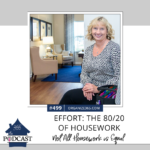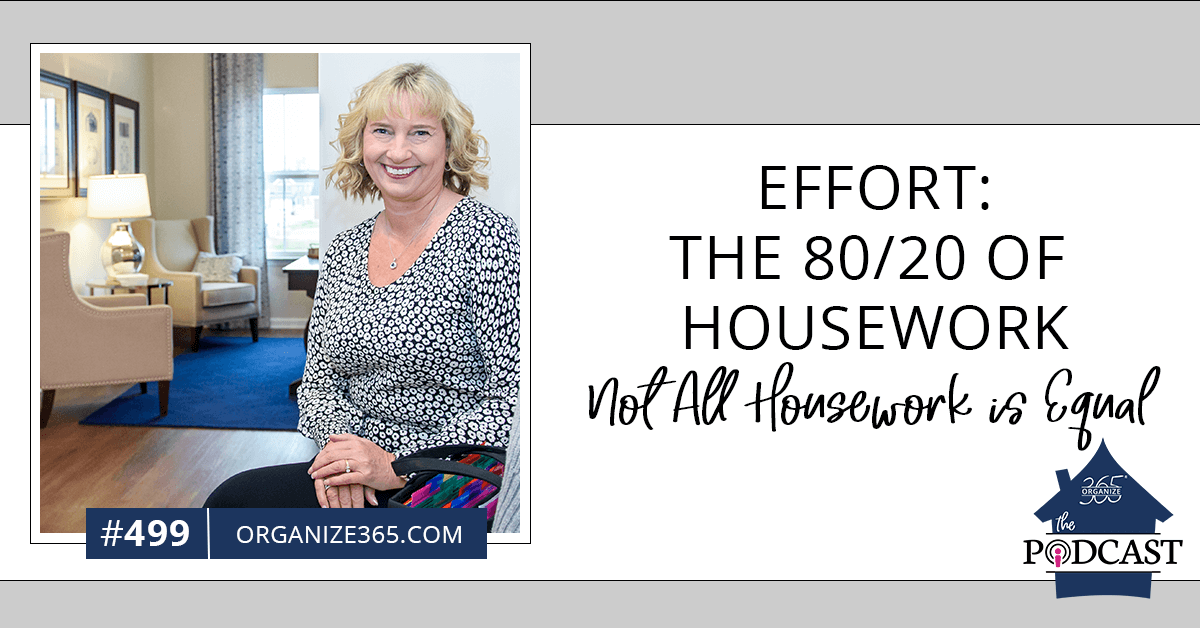
Effort: The 80/20 of Housework – Not All Housework is Equal
The Pareto Principle says that 80% of the fruit comes from 20% of the labor. I first learned about this principle when reading 80/20 Sales and Marketing: The Definitive Guide to Working Less and Making More by Perry Marshall. This is not just a sales thing. It can be seen in nature, road traffic, and math. So, I started thinking about how this 80/20 principle applies to our homes and housework.
I know that perfection is not attainable. Instead, I’ve resolved to strive for excellence. What does it look like to be an excellent homemaker?
Let’s start with an example of how we perceive cleanliness. I’ve shared previously that two of my neighbors recently sold their houses. One was very “clean” and somewhat minimalist but not organized while the other was eclectic yet organized but not as “clean.” Homebuyers who toured these homes regularly saw the first as not “clean” because it lacked organization while the second home was described as “clean” even though the housecleaning tasks were not performed to the same level as the first home.
We tend to equate cleanliness with organization. We are looking for an order, but “cleaning” your house doesn’t bring that order.
In this episode, I share with you how I have employed the 80/20 principle in my house to bring it to excellence but not perfection while also giving me time to do what I’m uniquely created to do. (Spoiler alert: We’re going to talk more next week about using that extra time!)
Seeing piles and cluttered spaces bothers me. I had to come up with a system that balances time and results. These are the things I had to think through:
- Define minimum expectations for a space.
- Determine how long a task can go before it must be done again.
- Decide who will do the tasks and when – delegating it if possible.
Here’s how I handle the four main things that make my home feel disordered:
Floors: Floors seem clear to me when they are clear enough to run a vacuum in the room. Early in my married life, I killed myself by vacuuming to unrealistic expectations that my husband didn’t even have for me. No more. Now we vacuum once a week. Because baby Grayson is crawling around these days, the family room is done once a day during this season.
Counters and Flat Surfaces: To me, the kitchen is clean when the dishes are washed and the counters are wiped down. But, you know this is a never-ending job. As soon as you finish the dishes, another dirty one appears. Earlier in my life, I’d do this job in the morning and evening, every day. If you’re cooking a lot and have a large family, this might be necessary. During this season, I do the dishes and counters a few times a week. I wash the dishes, run the dishwasher, wipe the sink, and wipe down the counters. After that, the priority is to keep the counters clear while dirty dishes are allowed to start piling up in the sink again.
Laundry: I do my laundry once a week. I usually start on Friday night or Saturday morning and by the end of the day on Saturday, all laundry is done. Any new dirty clothes can then live in the hamper until the next week. This frequency of doing laundry might require that you invest in more socks and underwear, and maybe pants for your family members.
Straightening and Tidying: My definition of my home being straightened and tidied is that I can have people over to the house. I have two different “Zamboni Sweeps” that I have developed over the years.
One is a 20-minute sweep that happens in the evening several times a week including Wednesday evening before our house cleaner comes on Thursday. This sweep includes clearing the floors, clearing the counters, and consolidating the piles. I allow piles to live in three places: one side of the counter with my Sunday Basket® for me, the other side of the counter for Greg, and the kitchen table for Abby. Anything for longer-term projects goes to the laundry room counter.
My 2-hour “Zamboni Sweep” happens on the weekend. This is my top-down, whole-house tidying. I start laundry and then work my way from the top floor down to the main floor. By the end, the dishes are washed, the rest of the laundry is done, and the laundry room counter projects are tackled.
I’ve learned to live with 20% piles. I don’t live in a museum. I also had to change my mindset and stop looking for one more thing I could get done before relaxing each night. This is good enough and my home feels clean.
What Does 80% Look Like in Our Programs?
Sunday Basket®
For the Sunday Basket® the main rule is: if it can wait until next Sunday, it must wait until next Sunday. If you’re doing your Sunday Basket® routine to perfect each week, you’re going it… <gasp>… wrong. You should be putting everything into your Sunday Basket® all week. Then process what’s in there once a week. Do anything with a deadline and pick three projects to tackle. Then be done. The point is to do less, to not do something that doesn’t need to be done. We gather these household actionable items so you can do them faster in one chunk of time just once a week. Remember: The goal of the Sunday Basket® is to do what needs to be done when it needs to be done. If it CAN wait, it MUST wait.
The Productive Home Solution™
My understanding of this 80/20 principle and the subsequent research studies conducted by Organize 365® led me to update The Productive Home Solution™ this summer. You can watch or listen to the orientation for The Productive Home Solution™ (and other programs) here. I’ve divided your home into four spaces to be organized.
- Personal Spaces
- Storage Spaces
- Paper Management
- Family and Communal Spaces
Working in one space at a time and getting it to 80% allows you to feel organized and eliminates Swiss cheese organizing. If you’re new to The Productive Home Solution™, I believe you should start with personal spaces because this is the quick win that many people need and it only affects you. These spaces can stay organized with minimal upkeep.
Next, I suggest that you do your storage spaces. Well-organized storage spaces can last years if not decades or the rest of your life. This gives you a longer-term win.
Then tackle your paper management. These spaces need to be updated occasionally, at least on a yearly maintenance schedule. Paper Organizing Retreats are a great way to get your paper organized.
Your family and communal spaces are the hardest to keep organized and are constantly changing, especially if you have kids. The dishes and the laundry alone are neverending. These spaces will stay more organized when you’re in a later life stage. Tackling this area last and setting reasonable expectations.
I hope this helps you see how to better balance your time and stop striving for unattainable perfection in your home. Let’s pursue excellence together!
Join me next week as we talk about the next step in this process – using your regained time for what you’re uniquely created to do!
Resources Mentioned in This Episode
- Book: 80/20 Sales and Marketing: The Definitive Guide to Working Less and Making More by Perry Marshall
- The Sunday Basket® System
- The Productive Home Solution™
- Organize 365® Research
- Paper Organizing Retreats



